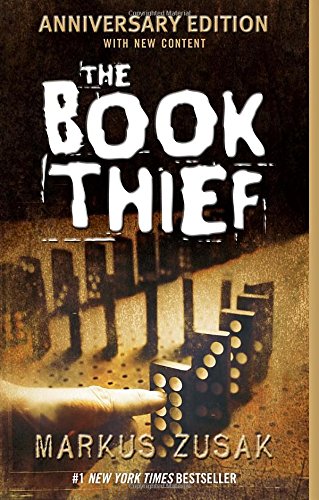All Nonfiction
- Bullying
- Books
- Academic
- Author Interviews
- Celebrity interviews
- College Articles
- College Essays
- Educator of the Year
- Heroes
- Interviews
- Memoir
- Personal Experience
- Sports
- Travel & Culture
All Opinions
- Bullying
- Current Events / Politics
- Discrimination
- Drugs / Alcohol / Smoking
- Entertainment / Celebrities
- Environment
- Love / Relationships
- Movies / Music / TV
- Pop Culture / Trends
- School / College
- Social Issues / Civics
- Spirituality / Religion
- Sports / Hobbies
All Hot Topics
- Bullying
- Community Service
- Environment
- Health
- Letters to the Editor
- Pride & Prejudice
- What Matters
- Back
Summer Guide
- Program Links
- Program Reviews
- Back
College Guide
- College Links
- College Reviews
- College Essays
- College Articles
- Back
The Book Thief by Markus Zusak
The Book Thief by Markus Zusak is a masterpiece. Narrated by Death, the historical fiction novel follows the adventures of Liesel Meminger as she steals books in Nazi Germany. Zusak provides incredible insight on the perspective of such an unknown force. The concepts of humanity and language are beautifully presented in this novel.
I thoroughly enjoyed Zusak’s writing style. He made me perceive Death as nonchalant, waiting in the shadows. For instance, "Mystery bores me. It chores me. I know what happens and so do you. It's the machinations that wheel us there that aggravate, perplex, interest, and astound me" (p243). The descriptive language adds more depth to Death’s character. It employs the technique of foreshadowing throughout the novel to provide insight on the fates of individual characters. However, as the plot progressed, Death was very remorseful for having to take so many lives. It was a refreshing outlook because I was not expecting it to have such a mindset. I found the tired, guilty disposition surprising, especially because we as a society greatly fear it.
Liesel is an orphan. She never knew her father, and her mother vanished after delivering her to her new foster parents. Her younger brother died on the train to Molching, where her foster parents, Hans and Rosa Herbermann lived. Liesel stole “The Gravedigger’s Handbook”, which was left lying in the snow by her brother’s grave. This was the initial spark in her passion for wanting to learn to read. As she began adjusting to her new life, Hans began teaching her the alphabet. Liesel became intrigued and eagerly studied everyday to finally be able to form words into sentences. It is the innocent characteristic of a nine-year-old that kept this book from being depressing with the horrible happenings of the war. Moreover, an integral part of World War II is intertwined within the events of this book. For instance, the barbarism displayed towards Jews, such as killing and torturing, is what left me speechless. “You want to know what I truly look like? I’ll help you out. Find yourself a mirror while I continue” (p307). Death is already cynical and weary from carrying the souls of the deceased. It begins to question the concept of war and humanity and how anyone was capable of committing such acts. The Book Thief had me saddened and simply horrified that this is what people had to endure.
Markus Zusak was born in 1975 in Sydney, Australia. Several awards given to this novel are the Michael L. Printz Novel, and the Kathleen Mitchell Award. It was named “Best Book” by the School Library Journal and the Young Adult Library Services Association, and was the editor's choice in the Kirkus Review and Booklist. The inspiration he had behind this notion was the stories his parents told him about growing up in Austria and Germany during the war. “What I wanted to do… was write someone’s favorite book,” rather than write for a specific audience, Zusak revealed in a 2007 interview.
Many things keep this book from being morbid. A lively tone is incorporated throughout the novel. The depth of the characters’ hearts left me very hopeful despite the circumstances. The message that was conveyed throughout the novel is that death is inevitable, but during the time in which we are living, we need to strive to enrich ourselves, and use our morals as our guide.
Similar Articles
JOIN THE DISCUSSION
This article has 0 comments.

